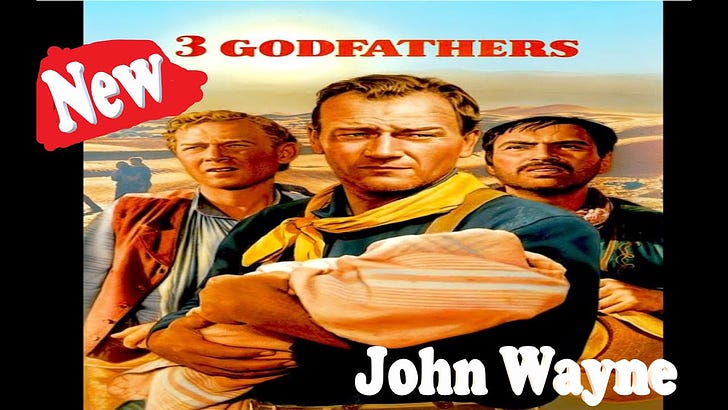Yes, you’re reading that title right. It’s meant to be the numeral 3, not the word. It distinguishes this film from the very different but just as compelling film based on the same short story, Three Godfathers (1936). Ours has a cheerful and heartfelt ending, while the earlier one ends in what looks like tragedy but is actually redemptive grandeur.
Advent is here, and so are our Christmas offers at Word & Song!
Now through Epiphany new, gift, and upgraded subscriptions are 25% off.
In any case, the story begins when three men, Bob Hightower (John Wayne), Pete (Pedro Armendariz), and The Abilene Kid (Harry Carey, Jr.), show up in a nice and bustling little western town, and after a pretty decent welcome, they rob the local bank. But the Kid takes a bullet and loses his horse and the money along with it, so the three have to get away on two horses, and they have nothing to show for their having taken advantage of the people of — ready? — Welcome, Arizona.
The sheriff of Welcome, a married man named Buck Sweet (but his real name is Perley, just as Bob’s middle name is Marmaduke, and yes, there’s going to be some jesting about those names), has asked the three whether they’ve come across a stagecoach on its way to Welcome. They haven’t, but that sets up their crucial encounter when they are on the run. Everything has been going bad for them. They have no water. The Kid’s wound is not healing. Sheriff Sweet (Ward Bond, in one of his finest and most genial roles) has stationed a guard at the nearby railroad water-tower. They have now lost their horses, too. And in these desperate straits, they find that stagecoach. There is only one person in it, a young woman (Mildred Natwick), on the point of giving birth. Pete assists — and the other two try to get some moisture for her, from somewhere — from the cactus trees. She gives birth to a baby boy, and she makes the men promise that they will take care of him and be his godfathers. Then she dies. And there you have the adventure of our Film of the Week. What makes it more poignant is that the young woman is the sheriff’s niece, and he’s going to believe that the three men are responsible for her death. He doesn’t know — and he has no way of knowing — that they have made a promise that will cost them dearly.
No more of the plot — no spoilers! We are great admirers of the films of John Ford, several of which we’ve featured here at Word and Song. Ford could be the most ornery and tart-tongued of directors, but the actors he worked with all the time understood the shtick, and they knew he’d make what they were doing into his own kind of vital and muscular poetry. John Wayne, Maureen O’Hara, Jimmy Stewart, Donald Crisp, Harry Carey both Senior and Junior, Ward Bond, and many more — knew that with Ford at the helm, they would not fail. But there was something else, too, something that Ford himself, a growler if there ever was one, didn’t much talk about. Ford, you see, a Roman Catholic, understood the human condition as a story of sin and sacrifice and the hope of redemption.
I’m not saying that he was pious and gentle and meek, or that he never did a very bad thing in his life. I mean instead that in Ford’s movies you have spiritual warfare in play, and that people who look like the worst sinners are often not so; and no one can match Ford for showing how the darkness of the human heart, evident in self-seeking, lack of mercy, avarice, and ambition, can destroy not just the sinner but a whole community. The question for Welcome, Arizona, is open: will it prove to be so?






My personal VERY favorite John Wayne films and performances: “The Man Who Shot Liberty Valance”; “Rio Bravo”; and, “The Quiet Man” … with Liberty Valance being (in my humble opinion) the best Ford/Wayne collaboration.
Good grief, you must know all of my favorite movies.